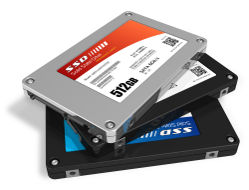Flash memory is no flash in the pan
Flash memory is no flash in the pan
 For many years now, the staple of data storage in your average computer has been the hard disk drive. These spinning magnetic disks are relatively cheap, reliable and can hold an incredible amount of data (like this huge 3TB model).
For many years now, the staple of data storage in your average computer has been the hard disk drive. These spinning magnetic disks are relatively cheap, reliable and can hold an incredible amount of data (like this huge 3TB model).
But the times they are a-changin', and in some places the stalwart hard drive is being edged out by a faster, slicker upstart: flash memory.
Flash memory is flashier
Flash memory is a kind of data storage that doesn't have any moving parts. This means it's much quicker to save and retrieve data, and usually more reliable than than hard disks, which spin at very high speeds.
Flash storage also tends to use less power, so it can help your laptop's battery last a little longer. It's already used widely in camera memory cards and smart phones. But it's now starting to make significant inroads in other areas.
High-end, super-portable laptops like Apple's MacBook Air and the Dell XPS 12 get some very real advantages from using flash memory, including lightning-fast startup and software loading times.
However, because flash memory is much more expensive than traditional hard drives, it has had limited impact beyond high-end computers. Could that be about to change?
Flash memory for everything
|
If it wasn't for the cost, flash memory would already have almost entirely replaced magnetic disks. On speed alone, it wins by a mile.
This means flash storage is brilliant in situations where you need to manipulate lots of data - like processing video files or accessing your customer database.
However according to market intelligence firm iSuppli, 524m disk drives were shipped globally in 2012, compared to just 39m flash drives.
Although we're some way off the death of the hard drive, predictions state shipments of flash drives will grow to around 83m in 2013 and hit 239m in 2016. In particular, expect corporate buyers to invest as they demand faster speeds and higher capacity.
Getting flash in your business
Market trends aside, flash memory could bring benefits to your business today. A good way to speed up your laptop or extend its life is to swap the hard drive for a type of flash storage called a solid state drive (SSD).
You can buy a 256GB SSD for under £130, or pick up a 512GB model for £300 - £350. Not cheap, for sure, but if you want to speed up or prolong the lifespan of a high-end laptop that's a couple of years old then an SSD can be a worthwhile investment.
The process of switching to an SSD is fairly simple. We'll be explaining how to do it in a blog post that's coming soon.
Alternatively, there are a growing number of storage devices that combine the best elements of both flash memory and disk drives. These 'hybrid' drives (like this model from Seagate) have both flash memory and a traditional magnetic disk.
The bits of data you access most frequently are stored in the flash memory where it can be accessed quickly, giving you a good balance between price and performance.
Flash storage could be the future. Is it time your business got in on the act?




Comments
Add a comment